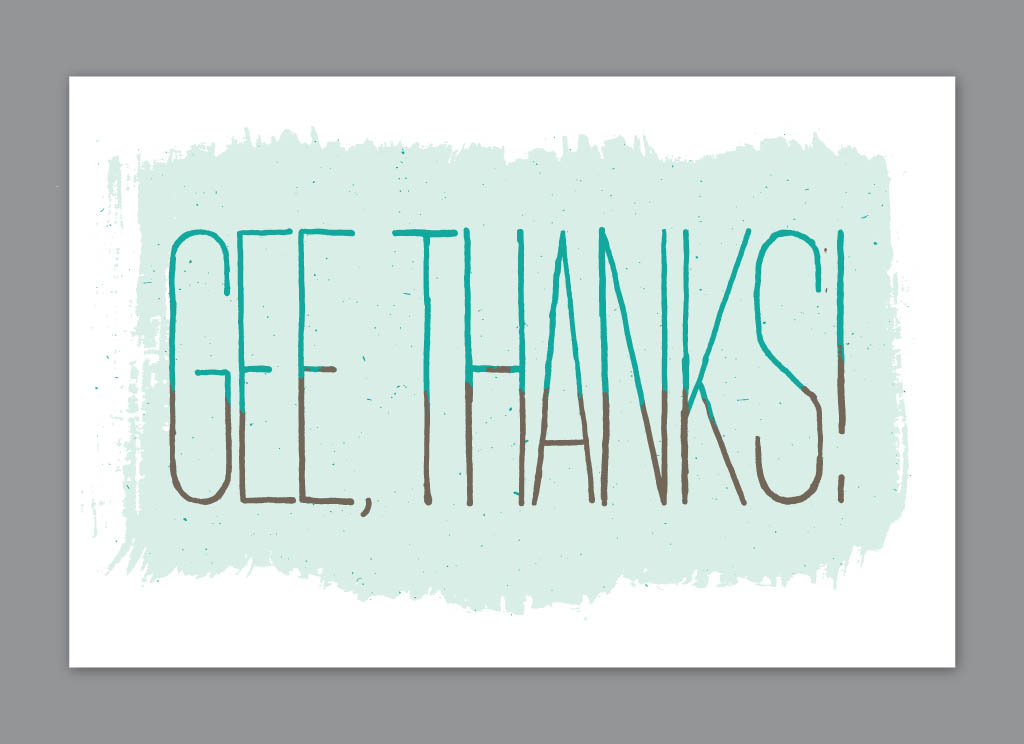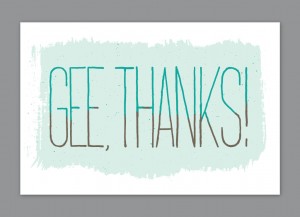S. had a day of interviews for a job she thought she wanted based on the posting, the organization’s mission and a phone interview. It seemed like the “right fit job” for her.
After the interviews, she has doubts. The reporting structure is different now from when the job was first posted, there were real tensions between departments that showed up during the interview, and there are questions about whether she’ll have the right staff and resources to do the job.
As she said today, “for the right now, I’m am tending against this job. But how do I handle thank you emails to all these people?”
Here’s my response: “I think thank you notes should reiterate what you liked about the job and being impressed with the mission and dedication of organization and its members, pleasure meeting them etc. Remember, it’s better to have them offer you the job than not. So be enthusiastic and genuine in what you say, all positive.”
I believe that until you get the job offer, you can’t make a real decision. So I advise acting as if you really want the job. There’s no guarantee you’ll get an offer. If you don’t get an offer, you get to feel the sting of rejection – and I think that’s never a good thing.
So eliminate all doubt as you write your thank you notes. Here’s why: If you have a lot of doubt about whether you want the job, it will be communicated to those doing the hiring, and you probably will not get an offer. Employers want to hire someone who wants to work for them. If you don’t know if you do, they pick that up.
J. Sewell Perkins says “if you want the job, it’s yours. If you have any doubt, it won’t be yours.” That’s my experience, personally and with many others.
My story: I was one of two finalists for a job that would have required me to move to California. I got a standing ovation during my final interview with the Board of Directors. It looked like it was mine to lose. And then I had a conversation about compensation. I communicated that the figure they were considering was probably too low. Guess what? I didn’t get the offer.
Were I to do it over again today, I’d say “I really want this job, and I think we can come to a mutually acceptable amount, so let’s not even worry about it. I know it will work out.” That way, I might have gotten the offer, and had the chance to make a real decision, based on solid facts instead of mere supposition. Because until the offer is in writing, it’s all make-believe on my part. As it was, my doubt and concern tilted them away from me and toward the other candidate.
Was that my “right fit job?” I don’t know because I didn’t give myself a full chance to find out. As it is, I’m fine with not getting that job because I love what I do now. Yet there is always that “what if?” lurking in the background. So I pass on my experience in hopes it will help YOU get the chance to decide “yes” or “no” on a job offer.




Julie…my issue is this: I love the company I interviewed wit and the idea of the job. I feel I’m a good fit for it, and liked the hiring manager and the potential work partner who was also in the interview. I felt we had a good rapport and had the same ideas on how to accomplish the job. I felt also that I interviewed well. I’m not sure if it was the best of my interviews, but I was at my most calm and collected on this interview than I’ve probably ever been. A lot of what this job would do would be to help promote the state I live in, which I’ve lived my whole life. The problem? The commute! Potentially, it is a 2-hour commute ONE way. The commute to the job, the hours spent on the job, and the commute home would essentially eat up my entire day. Not only would it become old fast, I didn’t have a particularly easy commute on non-peak time just to go down for the interview yesterday. I’m thrilled and honored to be one of only two candidates selected for the in-person interview, and do not take this fact lightly. The interview was brokered by an agency, so I’m at a complete and total loss as to what to first of all say to the agency, and then in how I word my thank-you note to the company who interviewed me. Any thoughts?
What a great problem to have! You had an interview, you like the company, they seem to like you. I would send a thank you note that emphasizes how much more interested you are in the job now that you’ve had a chance to meet with everyone. You want to be in the position of being offered the job, which means allowing yourself to be as enthusiastic as possible. And that’s what you tell the agency, too. I have clients who were in a similar position with a horrible commute to a job they liked. One found a friend who lives nearby and she goes to the office two days a week, staying overnight at the friend’s house; she works from home the other 3 days. She negotiated this once she got the job offer, saying she definitely wanted the job and wanted to see if they could work out an arrangement that would ease her commute. I assume you can’t move, but if that’s a possibility, I’d look into it. You also could look at going in very early and leaving early. What I’m saying is you will be able to come up with a solution if you are offered the job. So trust that it will work out and allow yourself to be excited for now. Good luck! And let me know what happens. Best, Julie
I appreciate your advice. I do want the job, but the commute is just impossible. I don’t want to close the door, because down the road, I may be in a position to re-open that door. I just can’t move right now. I’ve thought about it from every angle, and I just can’t. I emailed my agency contact yesterday to give her feedback on the interview itself, and all the positives. The one drawback, I told her, was still the challenging commute. (Mind you, the commute is a 2-hour one — minimum!) But, I never requested to be taken out of the running for the opportunity. Unfortunately, she has yet to respond to me. I know that they had a busy week ahead of them at the agency, and she knew in advance that the commute could be the one drawback from me when we spoke initially by phone on this — well before the initial phone interview. I’m trusting that by being mostly positive and not too focused on the one negative that I haven’t slammed the door by accident on anything. Right now, my challenge is how to end the thank-you note to the hiring manager. I will let you know what happens — either way. Thanks again!
Good luck! It’s always good to have a “Must Have List” – those things that really are non-negotiable. I don’t know what you decided to say to the agency, but a good way to approach it is with honesty: “after a lot of thought and discussion, I realize that I simply can’t manage a 2 hour one-way commute at this point in my life. It’s the perfect job except for that, so I hope you’ll keep me in mind for similar jobs closer to my location. I know I would add a lot of value.”
This is the most useless post ever. Say thank you and what you liked about the org but it is unclear if you should say you want the job.
“So I advise acting”…. it’s a written thank you note, you can’t “act” in written form.
Dear Martin, I’m sorry this disappointed you. I do think you should say you want the job. And you’re right, you can’t “act” in written form, yet you can “act” by assuming a feeling and attitude while you are writing the note. That’s what I meant. I guess, however, you were looking for something to criticize. When you seek to find fault, you will find fault. Hopefully, you will find much more to like in your job search and I hope you land your “right fit” job! Best, Julie
Thought this was great. I just used this. I went for an interview after the recruiter mentioned the position he had originally contacted me for was not going to be a fit but that his boss was looking for someone to fill a certain sales capacity. He asked if I would be interested as he had seen I had done this type of work in the past. I said I would be interested in having an initial conversation to find out more. I am not sure if I want to take on this role but I also have not gotten the offer yet. THANK YOU, THIS WAS EXACTLY WHAT I NEEDED.
~Rebecca
Hi Rebecca,
I’m delighted you used this post to help yourself get the interview for a job. You never know what you might want until you say yes when opportunity knocks!
Good luck,
Julie